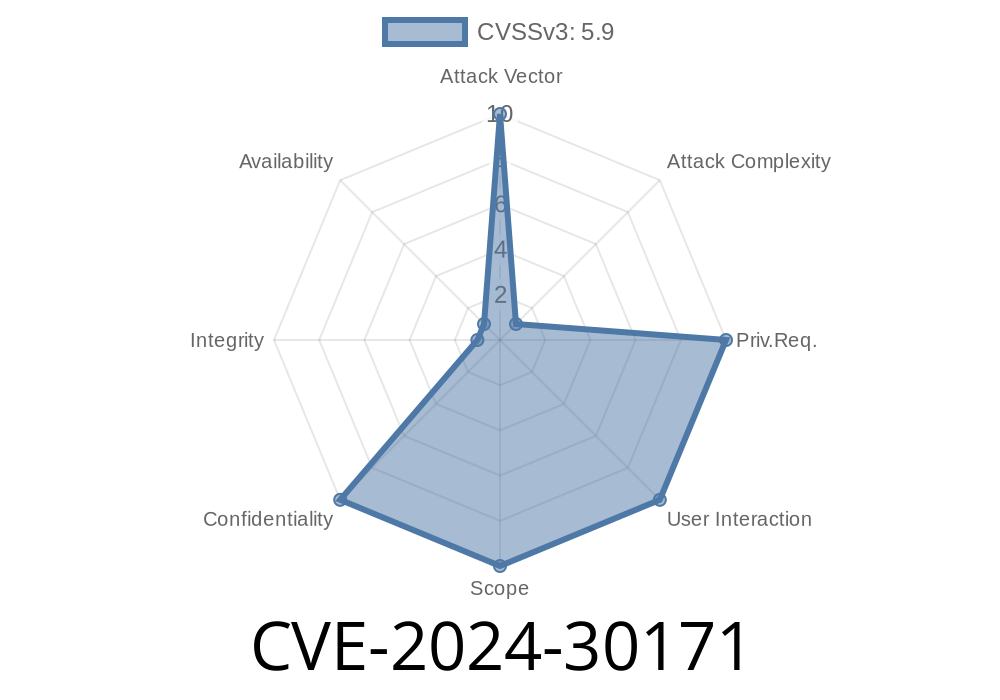Bouncy Castle is one of the most trusted libraries for cryptographic operations in Java. Used by developers and organizations worldwide, its TLS API and JSSE Provider power secure communications. But early 2024 brought a troubling discovery: CVE-2024-30171, a vulnerability exposing some RSA handshakes to timing-based information leaks.
In this post, we’ll break down what CVE-2024-30171 is, how the vulnerability works, what an attack might look like, and how to fix it. We’ll use code snippets and reference links for those who want to dive deeper.
What is CVE-2024-30171?
CVE-2024-30171 is a security vulnerability found in Bouncy Castle’s Java TLS API and JSSE Provider, affecting versions before 1.78.
Issue:
When an RSA handshake fails (for example, due to incorrect decryption or signature), Bouncy Castle’s code can take a different amount of time to process the exception than it takes if the handshake succeeds. This difference creates a timing side-channel—an attacker watching response times closely over the network might extract sensitive details, like plaintext bytes or even private key information.
References
- CVE Record on Mitre
- Bouncy Castle Release Notes for 1.78
Why Even Tiny Timing Differences Matter
Encryption should be a black box: you give it a message, and it spits out encrypted bits, always in about the same amount of time. But if you can reliably measure a few extra milliseconds when the server gets a bad padding, for example, you could start guessing how systems work internally.
This is known as a timing attack. Over repeated tries, a patient attacker can exploit very small differences to reconstruct the original private data.
How Did the Flaw Happen?
Previous Bouncy Castle versions would process handshake errors—like a bad RSA decryption—by throwing an exception, where exception-handling logic was distinct and sometimes slower than a successful handshake. That gap is enough to create a side channel.
Vulnerable Example (Simplified Java Pseudocode)
try {
// Simulate RSA decryption in handshake
byte[] decrypted = rsaDecrypt(cipherText, privateKey);
// If correct, proceed as normal
processHandshake(decrypted);
} catch (BadPaddingException e) {
// Takes a different (possibly longer) code path
handleBadPadding();
}
If rsaDecrypt() throws a BadPaddingException, the error path is different and may be noticeably slower, so an attacker can distinguish failure from success by measuring the response time.
Exploit Scenario: Attacking RSA Handshakes Remotely
Let’s imagine a server running a vulnerable Bouncy Castle version. An attacker sends intentionally malformed handshake messages, then carefully measures how long each response takes. By tweaking just one or two bytes at a time and analyzing delays, they may discover:
Which paddings are “correct” versus “incorrect”
- Information about the private key, if they repeat this enough (using advanced attacks, e.g., Bleichenbacher’s)
Proof-of-Concept: Timing Measurement (Python Example)
Here’s a simple proof-of-concept that shows how you might test for timing differences in handshake response.
import socket
import time
target = ('vulnerable-server', 443)
ciphertext = b'...' # Malformed or varied ciphertext
with socket.create_connection(target) as sock:
start = time.time()
sock.send(ciphertext)
try:
response = sock.recv(4096) # Wait for response or TLS alert
except Exception:
response = None
elapsed = time.time() - start
print(f"Handshake took {elapsed * 100:.2f} ms")
Change the handshake data and repeat. If the server’s timing reveals consistent differences for “good”/“bad” ciphertexts, side-channel exploitation is likely possible.
How Was It Fixed?
Bouncy Castle fixed this in version 1.78 by ensuring error processing paths take the *same* amount of time as successful handshakes:
Upgrade immediately to at least version 1.78!
- Bouncy Castle 1.78 Download
- Release Notes
What Should Developers Do?
1. Upgrade Bouncy Castle (Java TLS API/JSSE Provider) to 1.78 or later.
Always use constant-time error handling.
3. If you must use RSA handshakes (not recommended in modern systems), double-check your providers for side-channels.
Final Thoughts
CVE-2024-30171 is a classic example of how small implementation details—even seemingly harmless exception handling—can undermine cryptography. Timing attacks are real, remote, and in some cases, devastating.
Don’t wait to patch. And if you’re writing cryptographic code, remember: constant-time, everywhere, always.
Further Reading
- Mitre CVE-2024-30171
- Bouncy Castle Homepage
- OWASP: Side Channel Attacks
Timeline
Published on: 05/14/2024 15:21:52 UTC
Last modified on: 08/19/2024 18:35:08 UTC
